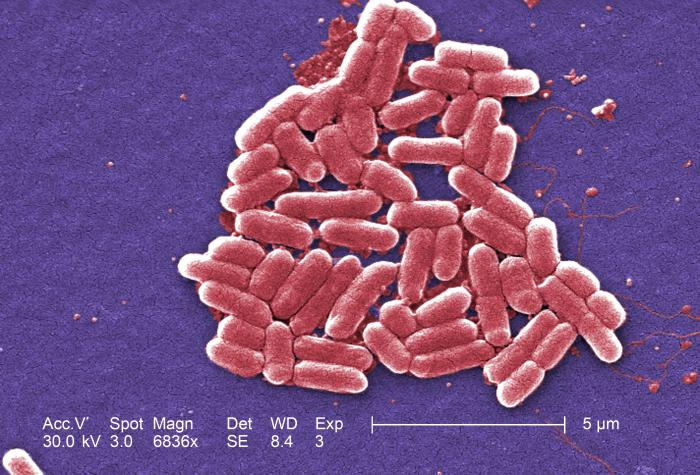HILLSBURGH – The village of Hillsburgh is under a boil water advisory following the discovery of E. coli and coliform bacteria in the water system.
Levels of E. Coli and coliform bacteria were found in a lab-tested water sample, according to a Wellington-Dufferin-Guelph Public Health (WDGPH) notice issued on July 12.
E. coli is a group of bacteria found in the environment, in food, and in the intestines of people and animals. Some forms are harmless, others can cause debilitating illness.
An E. coli outbreak contaminated Walkerton’s drinking water supply in 2000, resulting in the deaths of seven people and illness in hundreds more.
The number of days between when a person is infected with E. Coli and when symptoms may show ranges from three to seven days, according to WDGPH, though symptoms can begin anywhere from one day to two weeks following infection.
Coliform bacteria is found in soil and in water affected by surface water, and in human or animal waste.
Neither bacteria should be present in drinking water, and are indicators that other pathogens may be present.
Periods of heavy rain can cause surface water to infiltrate municipal water systems.
“The investigation is sort of ongoing but it is not atypical, according to our health protection team, for something like this to happen after a significant rain event,” WDGPH spokesperson Danny Williamson told the Advertiser.
The Town of Erin’s water system, including a separate system supplying Hillsburgh, is managed by the Ontario Clean Water Agency (OCWA), which conducts regular monitoring and sampling of drinking water in the town and village.
OCWA regional manager Caralynn McRae told the Advertiser the July 11 sample was taken from a source on Spruce Street.
McRae wrote in an email that results were immediately reported to WDGPH, the Ministry of Environment, Conservation and Parks, as well as the Spills Action Centre.
“Operations staff immediately took corrective actions of flushing and resampling of the location area,” McRae added.
The local health unit was made aware of the situation by OCWA around 4:30pm on July 12, and responded by issuing a boil water advisory, Williamson said.
McRae said the water agency received the health unit’s advisory at 6:03pm on Wednesday.
The advisory, from WDGPH Medical Officer of Health Dr. Nicola Mercer, states the public health unit took action after “a water sample taken on July 11 indicated the presence of total coliform bacteria and E. coli bacteria which is considered unsafe for drinking.”
WDGPH officials recommend Hillsburgh residents bring water intended for drinking and cooking to a rolling boil for at least one minute.
“Timing starts when large bubbles begin to continuously rise and break rapidly at the surface,” the advisory states.
Water can be cooled and either used immediately or refrigerated for later.
Switching to bottled water is also an interim option.
The advisory is in effect until two additional water samples, provided 24 to 48 hours apart, return clean lab results. Then the boil water advisory can be lifted.
“The testing process is ongoing and may take several days,” Williamson said.
Water samples are being sent to Mississauga-based Bureau Veritas Laboratories.
McRae estimates the advisory will be lifted Friday evening.
“OCWA will continue to resample and test, increase chlorine, and flush watermains and take other steps as directed by the Ministry of Health,” McRae wrote.
Notice of the advisory first appeared on the Town of Erin’s social media channels on the evening of July 12, but little information was provided.
A reporter placed a call to the OCWA to try and obtain more details, but an official speaking by phone said only that a water sample returned test results that were not within an acceptable range.
The official added the advisory applied only to Hillsburgh residents on the municipal water system, not those with private wells.
The reporter specifically questioned if E. Coli levels were above acceptable levels, but the official said they didn’t know.
The boil water advisory issued by WDGPH wasn’t relayed to media by Erin senior communications officer Lavina Dixit until July 13.
Dixit told the Advertiser the town was notified of the E. coli discovery at around 6:30pm on July 12.
“The town put the information immediately out to the media, Erin Radio, on social media, [and our] website,” Dixit stated in an email, adding notice was also hand-delivered to Hillsburgh residents.
“The official notification was received much later last night, which had more information,” Dixit wrote.
According to Dixit, OCWA relayed the health unit’s boil water advisory to the town at 7:16pm on July 12.
Questions emailed to the Ontario Ministry of Health were deferred to WDGPH, and questions emailed to the provincial environment ministry went without responses as of publishing.
A boil water advisory lasting two days was previously issued for Erin in March following a watermain break there.
The town posted notices of the advisory to social media channels at the time, but complaints to the town suggested several residents were unaware the advisory was in effect, and only found out about it from a community Facebook page.
Erin council passed a motion from councillor Bridget Ryan in April compelling staff to report back to council on what happened, key roles and responsibilities, and an action plan to notify residents “in an expedient manner” in the future.
That report was to be discussed at a July 13 council meeting.




